
WELCOME TO THE NEXT - 16th EDITION OF THE ONE-YEAR COURSE ON PROCESS ORIENTED PSYCHOLOGY
Warsaw: October 2020 - June 2021
The course will be held in Polish only
* * * *
The one-year introductory course of process-oriented psychology is intended for students of psychology, psychologists, educators, people working with people and anyone interested in their own development. It consists of 9 weekend workshops. Workshop classes conducted as part of the course allow you to gain orientation in the methods used in process work, as well as provide the opportunity to work intensively on yourself and allow you to see the directions of your own development. They can also be used as a base, which people interested in more intensive study can supplement with additional classes.
The training ends with obtaining a certificate and can be part of the training program of the Process Work Study Center Foundation accredited by the Polish Society of Process Psychology.
The training meets the standards of the Polish Psychotherapy Council.
Workshops cover the following areas of process work:
* theoretical and philosophical foundations of process work,
* body and symptoms work,
* dream work,
* working with interpersonal relationships,
* altered and extreme states of consciousness,
* addiction,
* working with the internal critic,
* work with large groups and the world,
* conflict resolution,
* communication skills.
Participation in individual, selected classes is not possible. We only accept declarations of participation in the entire training cycle – enrolling in the Course is a declaration of participation. Absence does not release you from the workshop fee.
Teachers:
Certified PTPP and IAPOP therapists – dr Bogna Szymkiewicz, Hanna Wieloch, Joanna Boj, Jarosław Józefowicz, Wojciech Wojnarowicz, Wojciech Pierga and others.
Dates:
Weekend workshops take place on Saturdays at 10:00 - 18:00, Sundays at 10:00 - 16:00.
We anticipate the possibility of participating in classes online. The dates of the workshops will be announced at a later date.
Price:
PLN 3,900 – payable in three installments: PLN 600 at the time of registration; PLN 2,000 - until October 1, 2020; PLN 1,300 - until January 15, 2021.
ATTENTION! Payment by July 31, 2020 of the first two installments allows you to take advantage of a discount – PLN 200, on the entire training course. If you are in a difficult situation, you can apply to spread payments over a larger number of installments.
Registration and information:
administracja@psychologia-procesu.pl, and tel. 504 422 124
https://www.facebook.com/PsychologiaProcesuPTPP
We invite you to an information meeting that will take place on September 28th at 7 pm at the headquarters at ul. Świętokrzyska 32 m 48 A or online
The first installment in the amount of PLN 600 is an administrative fee related to the organization of the course and is nonrefundable.
What is process oriented psychology?
Process oriented psychology is a theoretical concept and work method, created by Arnold Mindell and his colleagues. As a theory, it accurately describes the flow of experience: the dynamics of how we define ourselves and what happens to us. As a method, it helps to discover the unconscious aspects of experience hidden in our dreams, in the body, in relational problems, in signals that we do not pay attention to. It helps in revealing and resolving internal (and external) conflicts so as to support the use of existing potential – of an individual, a couple, a family or a group.
Process oriented psychology does not use pre-defined standards to be followed, but helps discover what is needed and appropriate for each and every one of us.
Introductory class
The first class is an introduction to process work. We present the basics of the concept, its sources and main concepts. We learn to look at ourselves in terms of the flow of experience - continuous changes and repetitive patterns. We present the concept of the primary and secondary process: the primary process is our current identity, what we identify with in our experience. The secondary process is everything that catches our attention, but appears outside our identity, what happens “to us”: it attracts, fascinates, distorts, hurts, disturbs - and at the same time is potentially a source of important information and development. We learn mindfulness, observing signals and not judging what appears in our experience.
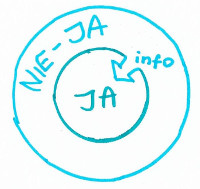
Dream work
Dreams have fascinated people for centuries. Since Freud, psychology has been helping to understand the meaning of dreams. Process work is rooted in C.G. Jungs analytical psychology, in which dreams occupy a very important place - as the basic source of information that the unconscious wants to give us. Process oriented psychology uses Jungian methods of working with dreams, proposing its own techniques as well. Workshop classes include learning about the code that dreams use to hide and provide important information at the same time. We also learn how to immerse ourselves in the "dreaming process" and capture hidden meanings from within, through our own experience.
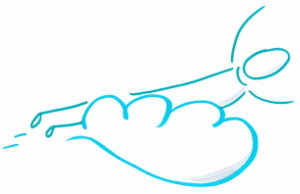
Working with the body and physical symptoms
Process oriented psychology proposes specific methods of working with the body, including physical symptoms.
It is not a method of treatment - this aspect it leaves to classical medicine and other alternative approaches to health and disease. From the point of view of process work, every ailment, apart from requiring appropriate treatment, carries potentially important information. The body "speaks" its own language, providing information on marginalized aspects of our personality, repressed memories and needed, unused energies. During the workshops we learn the basic assumptions and techniques of working with physical symptoms.

Working with relationships
During the course, we also work with relationships. Contact with people, especially those close to us, can be a source of both a deep sense of fulfillment and great suffering. We reflect in others like in mirrors, seeing in them our own flaws, but also potential, which we do not have the courage to see in ourselves. In this sense, relationships provide important clues about our own "shadow" and our capabilities - we learn how to use more fully what we can become and how to transform what appears to be negative at first glance. We are also looking at mutual interactions: communication between people is full of secrets - signals carrying new information and hidden patterns that make communication difficult. During the workshops we learn to discover and change them. We also learn methods of working with conflicts and other difficult situations in relationships.
We carefully stop at traumatic experiences, presenting work methods to be used at the right place and time.

Inner critic
An important element of everyday functioning is the relationship with the so-called "Inner critic". An inner critic represents attitudes towards such own behaviors and experiences that we assess negatively. A critic may be a mobilizing voice, may have "good intentions" but act in an unacceptable way, or be an extremely destructive force that blocks us from development and which we need to defend against. During the workshops, we learn how to deal with the negative aspects of the inner critic and how to reach potentially useful advice and energy.
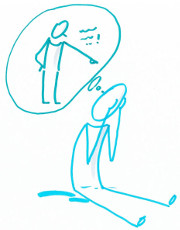
Altered states of conciousness
Process work also deals with the experiences of other than “normal" states of consciousness. It shows how the whole spectrum of different states, from deep meditation, through every day, small trances, moods or emotions, to suffering-causing psychotic states, is part of the human condition. We learn how to be in better contact with ourselves even in altered states of consciousness, we check what they may be needed for and also - how to make contact with people with whom ordinary contact due to their state of consciousness is difficult or impossible.
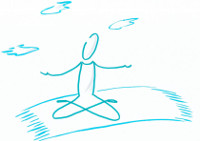
Addiction tendencies
The need to experience other states of consciousness is one of the factors prompting one to try a variety of stimulants or to repeat activities that, by creating habits, get out of control. From there, it is a small step away from addiction - although, of course, their causes are much more complex and multidimensional. Process work is not a cure for addiction, but it can help you discover what you are unconsciously looking for in more or less toxic substances or behavioral patterns. At workshops, we do not deal with serious addiction, but we learn to better understand and discover what our addiction tendencies are for - such as excessive drinking of coffee, sweets, a bit too frequent shopping.

Worldwork
Process oriented psychology is not limited to working with an individual or a couple. It proposes specific techniques for working with a group, allowing to see its unconscious aspects. It considers the fact that as individuals we live in a specific world full of political and social problems. As part of the course we present the basics of the so-called "Worldwork”. We deal, inter alia, with how social tensions between minorities and the majority, differences in rank and position, privileges and prejudices affect our daily functioning.
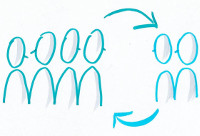
#
The course is conducted in groups from a few to twenty people. We organize two forms of classes: a one-year course, consisting of 9 weekend workshops (from October to June, one workshop per month), and an Intensive Course - 3 weeks from Monday to Friday at the turn of June and July.
Classes include elements of theory and working through own experience: exercises in pairs or small groups. They are conducted by experienced teachers with psychotherapeutic and coaching qualifications confirmed by the Polish Process Work Association and the International Association of Process Oriented Psychology.
Drawings: Bogna Szymkiewicz-Kowalska



